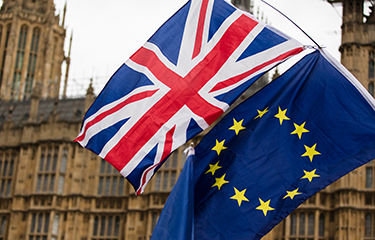The trade deal agreement reached at the eleventh-hour by the European Union and the United Kingdom has brought some relief to U.K. seafood exporters. However, some in the catching sector have been left feeling extremely shortchanged by the new arrangements, particularly where E.U. vessel allowances are concerned.
Following several weeks of negotiations, U.K. Prime Minister Boris Johnson and European Commission President Ursula von der Leyen announced that a post-Brexit trade agreement had been reached on Christmas Eve, with the terms expected to allow the U.K. to conduct a smoother departure from the E.U.
In a statement confirming the deal, Johnson said that the U.K.’s share of fish in its waters would rise substantially from roughly half currently to nearly to two-thirds in 2026, after which there would be “no theoretical limit beyond those placed by science or conservation on the quantity of our own fish that we can fish in our waters.”
Johnson also announced a new GBP 100 million (USD 136.9 million, EUR 111.4 million) program to help fishing communities modernize their fleets and the fish processing sector.
The Trade and Cooperation Agreement (TCA), which entered into force on 1 January, includes a five-and-a-half-year transition period whereby each party will grant full access to vessels of the other party to fish specified TAC and non-quota stocks in respective exclusive economic zones. The so-called “Crown Dependencies” of the U.K. will have a similar arrangement.
There will be zero tariffs on goods traded between the E.U. and the U.K., which means that access to lucrative E.U. markets – a priority for many U.K. seafood businesses – can be maintained, albeit with new export health certificates, catch certificates, and other labeling requirements.
U.K. public body Seafish said that with three-quarters of the country’s seafood exports going to the E.U., agreeing to a trade deal was important for the future of the sector, but it also acknowledged that the arrangements on access to waters and future quotas would be disappointing for some.
Fishing quotas and access to waters had been a contentious area in the trade deal negotiation process, with U.K. fishers hoping for an exclusive 12-mile limit for the inshore sector, fishing opportunities based on zonal attachment, and control over fishery regulations.
The Cornish Fish Producers’ Organisation (CFPO) is among those that believe the outcome was not a good one for British fishermen, insisting that the region’s fishermen feel betrayed by the new arrangements.
“We’ve had our expectations continually raised by the prime minister and [members of parliament] for years now. Promises of full and absolute control of our waters and better fishing opportunities have been made time and time again only to be shattered at the final moment. For government to say this is a good deal is hugely disappointing, it is certainly not the deal we were led to believe we would receive, and it has left Cornish fishermen feeling angry and insulted,” CFPO CEO Paul Trebilcock said.
However, Trebilcock acknowledged that it was “a positive” that U.K. fish exports would not attract tariffs, even though they would now be subject to new controls.
“The anger and frustration of Cornish fishermen has been compounded by misleading statements from government and the prime minister that this was a good deal for fishing. The government should be clear that fishing was sold out in order to achieve a deal overall – expecting the industry to ignore the many, explicit promises to fishing communities that have been broken within this agreement has been received as insulting and naïve,” Trebilcock said.
According to the Scottish government, the deal will also lead to a reduction in the volume of key fishing stocks landed by the nation’s fleet. In a statement, it said that the Scottish industry would have access to less of its valuable staple fish stocks like cod, haddock, whiting, and saithe than under the E.U. Common Fisheries Policy arrangements – even at the end of the five-and-half-year phase-in period. This is because under the terms of the Brexit deal, the swapping of quotas with individual member states is no longer allowed and leasing will be prohibitively expensive, reducing the quantity of fish in certain stocks available for the Scottish industry to land.
“This also has a potential knock-on effect for harbors, fish markets, and processors – fewer fish caught means fewer being landed and sold on for processing in facilities all around Scotland,” it said.
There should be some modest gains in Scotland’s pelagic landings and with some other stocks, the government said.
With regards to the movement of seafood products between the U.K. and the E.U., the following changes took effect on 1 January:
- For the preferential tariff rates to apply, goods must originate in either the U.K. or an E.U. member state. The agreement also sets out the rules of origin criteria and the paperwork that must be completed to prove eligibility. Rules of origin applies to where fish and shellfish are farmed, caught, or processed.
- Customs procedures, including the lodging of import and export declarations, are still necessary even if no tariffs are payable.
- Meanwhile, the E.U. and U.K. have agreed to regulate separately on food safety and product standards, meaning there are checks at the E.U.-U.K. border to ensure imported products meet the required regulatory standards. Therefore, export health certificates, catch certificates, and labeling requirements have to be in place.
Photo courtesy of Ink Drop/Shutterstock







